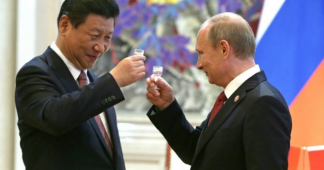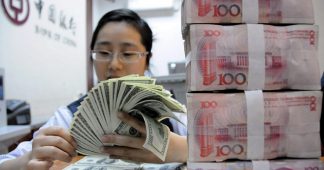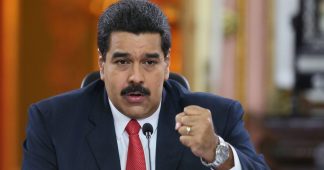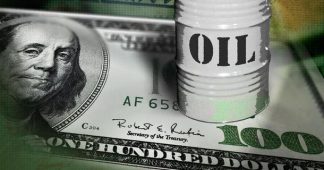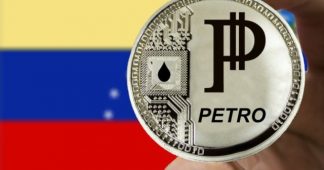This morning, history was made as China began trading Yuan denominated oil futures contracts on the Shanghai International Energy Exchange. According to Liu Shiyu, the Chairman of the China Securities Regulatory Commission (CSRC),
“We have the confidence, determination and ability to build a crude oil futures market with Chinese characteristics, and make due contributions to better protect the legitimate rights and interests of investors, and better serve the high-quality development of the real economy”.
International markets have reacted confidently to the launch of the Petroyuan, with the price of oil reaching a three year high. At a time when China is faced with an ever more hostile US as Donald Trump has acted unilaterally to place over $50 billion worth of tariffs on China, the Petroyuan is a symbol of China’s monetary independence and is also symptomatic of a world that is increasingly eager to do international commerce both with and in China.
As RT reports, “Trading of the new oil futures contracts for September settlement started on the Shanghai International Energy Exchange at 440.20 yuan ($69.70) per barrel, reports Chinese daily the South China Morning Post. Some 18,540 lots have reportedly been sold and purchased so far”.
Due to the US announcing tariffs on Chinese goods just days before the planned launch of the Petroyuan, it is highly likely that the US tariffs were specifically enacted in order to upset positive economic trends in China on the eve of a momentous occasion both for the Chinese domestic economy and for China’s commercial outreach to the wider world.

To understand the significance of the Petroyuan not just to China but to the world, one must understand the background of how in the 20th century, the energy trade became indelibly linked to the US Dollar. Today this link has been uncoupled and traders throughout the world will now have the opinion of buying and selling in the Chinese national currency.
Black gold
Between 1944 and 1971, the international monetary system, known colloquially as the Bretton Woods System, revolved around the gold backed US Dollar. Whether in Africa or Asia, a US Dollar was literally as good as gold, because it was pegged to and therefore could be converted to gold anywhere in the world. Then in 1971, US President Richard Nixon made the decision to un-peg the US Dollar from a gold standard, thus transforming the world’s major currency into a floating fiat currency.
In order to maintain the Dollar’s position as the world’s leading currency, the US reached an agreement with the leaders of OPEC, Saudi Arabia in particular, to sell oil exclusively in US Dollars, irrespective of who the buyer was.
As Goes The Money–So Goes The Influence
This system remained largely unchallenged until the the arrival of a non-Dollar based economy, China, as the new leading economic power of the world, whose GDP will soon eclipse that of the US. Already, China purchases more oil than any other country in the world, in spite of its increased domestic energy production and furthermore, China now has the world’s highest purchasing power of any nation on earth. Even before oil became the highly valued commodity that it became in the 20th century, the nation with the largest economy and more importantly, the largest and most wide reaching purchasing power, has traditionally set the bar for their own currency becoming the de-facto global currency of exchange and the most pervasive reserve currency for global treasuries.
China has therefore set the stage for a 21st century where in the medium term future, people will begin to refer to the value of international commodities based on their relative worth in Yuan rather than the US Dollar. As financial trends tend to follow monetary trends, this also means that Yuan based financial institutions will soon be able to leverage global corporations more fully than the western financial institutions which mostly deal in Dollars.
As Wall Street, the City of London and Frankfurt ready themselves to take a secondary role to Chinese markets, the reality of how western economies have become overly dependant on financial capitalism, as opposed to economies dependent on production as a major creator of wealth, will become starkly apparent. The west is about to lose its last globally respected and feared asset- the almighty Dollar and all of the institutions that it is associated with.
Petro-Geopolitics
For China and China’s partners this means that they will be able to set the terms of major international trade deals. For OPEC, it means intensifying discussions with China and China’s long term partners, as opposed to the US and its long term partners. This means that even traditional US allies like Saudi Arabia will begin looking to open new doors with China in preparation for an oil export market that will see banknotes featuring images of Mao Zedong supplant those with images of George Washington.
This will have a knock on-effect in geopolitics, making the richest countries in the Arab world, particularly those in the Gulf Cooperation Council, less attached to US foreign policy making. If China becomes their biggest trading partner and if the trade is conducted in the Petroyuan, it will be China whose geostrategic goals will be able to hold sway in the court of Gulfi Arab monarchies rather than the whims of Washington. Already, Saudi Arabia has begun courting China, likely in order to attract investment for its new megaproject, the creation of a massive new city on the Gulf of Aqaba.
US Sanctions Lose Their Effectiveness
The Petroyuan will also help to render US Treasury sanctions far less effective, as countries whose global trade is linked in with Chinese monetary and trade policies, will be out of the loop of the US Dollar based system. This represents new opportunities for countries as diverse as Syria, Venezuela, Iran and if the right conditions are met from Beijing’s perspective, also the DPRK.
While Washington denies that its Federal Reserve system is now the biggest basis for its continued, however waning international influence, the fact that US political leaders are openly horrified by the arrival of China and its Petroyuan, is a prima facie admission that while China has industry, innovation, military might and is on the cusp of edging the Dollar out as the world’s leading reserve and trading currency, soon the US will have little but military might to show for its superpower status and given how expensive this military might is for the US, the changes in world monetary markets, could also impact America’s ability to invest in its own military-industrial complex.
The Myth of An “Undervalued” Yuan
Of course, the US accuses China of purposefully undervaluing the Yuan so as to make Chinese exports more affordable and thus attractive. What the US hasn’t considered is that when the Yuan becomes the de-facto global reserve currency, it’s floating rate will likely be higher than that of the US Dollar. In this sense, the lesson for the US is “be careful what you wish for” and the lesson for China is that if the US seeks to shut Chinese goods out of the US market with tariffs, sanctions or even embargoes – then China has nothing to lose by floating the Yuan and letting the Dollar’s value sink vis-a-vis the Yuan.
Conclusion
China is in a win-win position vis-a-vis the US Dollar, while in the US, Washington and Wall Street will have to examine how major European currencies coped in the post-Bretton Woods and pre-Euro period. Ultimately, the only way the US will be able to cope in such an environment is to invest more into domestic production in order to regenerate confidence in a Dollar whose value will have to be based on what America does, rather than what America was. While technically the US still is a monetary leader, when the Yuan inevitably eclipses the Dollar, the US will have to get used to the word “was” in respect of global hegemonic monetary dominance. Much to the relief of millions, the US will no longer be able to peddle the lie that US hegemony is due to a somehow superior political and social system. The reality that US hegemony is based on the accepted value of the Dollar will be starring the US, its allies and its adversaries in the face like an emperor without clothes.
Both the US and China are waking up to new realities. China has shown that it is fully in control of its destiny while the US, having been so busy trying to control the destinies of other nations, has neglected to look after its own.
